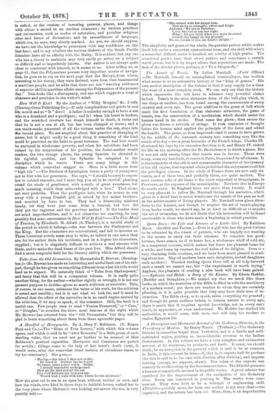The Annals of Tennis. By Julian Marshall. (Field Office.) —Mr.
Marshall, himself an accomplished tennis-player, has written what seems to us an exhaustive history of the "king of games." His own modest description of the volume is that it may supply for a time the want of a more complete work. We can only say that the history which supersedes this will have to advance very powerful claims indeed. Tennis is tho most elaborate form of the ball-play which, in one shape or another, has been found among the amusements of every country and every ago. The great addition to tho game of ball which made the first foundation of that elaborate structure, the game of tennis, was the construction of a mechanism which should assist the human hand in its stroke. First came the glove ; then across the glove was drawn a network of strings. It took centuries of thought before the human mind applied the principle of the lever and added the handle. The game, as thus improved—and it seems to have grown by the middle of the sixteenth century into something very like the tennis of to-day—was a groat favourite of the French kings. Charles IX shortened his days by too excessive devotion to it, and Henry IV. risked his life on the morning after the St. Bartholomew to finish a game. But it was not only among kings that tennis was in favour. There were many, some say hundreds, of courts in Paris, frequented by all classes. It is characteristic of tho selfish and unreasonable character of the tyranny of the old regime, that repeated edicts prohibited the enjoyment to all but the privileged classes. In the whole of France there are now only six courts, and of these two, and probably three, are quite modern. The most curious relic of old times is the court supported at Draguignan, in Provence, at the expense of the municipality. Nowhere else in Europe do courts exist. In England there are more than twenty. It would be very pleasant t3 follow Mr. Marshall through his narrative, which gives in a detail that is never wearisome the annals of the past as well as the achievements of living players. Mr. Marshall oven gives direc- tions to the learner, and though to acquire the art of tennis-playing from books would, wo should say, be at least as difficult as to acquire the art of swimming, wo do not doubt that his instruction will be found serviceable to those who have made a beginning in actual practice.


































 Previous page
Previous page